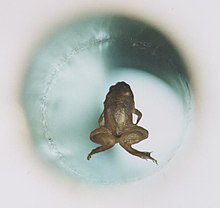Ig Nobel Prize
The Ig Nobel Prize is a parody of the Nobel Prize, which is awarded every autumn to celebrate ten unusual or trivial achievements in scientific research. Since 1991, the Ig Nobel Prizes have been awarded to “honor achievements that first make people laugh, and then make them think.” The name of the award, the “Ig Nobel Prize” (/ˌɪɡnoʊˈbɛl/ IG-noh-BEL) is a pun on the word ignoble, an achievement “characterized by baseness, lowness, or meanness”, and is satirical social criticism that identifies absurd-sounding, yet useful research and knowledge.[1]

Organized by the scientific humor magazine, the Annals of Improbable Research (AIR), the Ig Nobel Prizes are presented by Nobel laureates in a ceremony at the Sanders Theater, Harvard University, and are followed by the winners’ public lectures at the Massachusetts Institute of Technology.[2]
History and Organization
changeThe Ig Nobel Prizes were initiated by Marc Abrahams, the editor of the scientific humor magazine Annals of Improbable Research (AIR). Each year, the awards are presented in a lively ceremony at Sanders Theater in Harvard University, where Nobel laureates hand out the prizes to the winners. The event is known for its humorous and entertaining atmosphere, featuring a mix of comedy, science, and quirky presentations.
After the awards ceremony, winners are invited to give public lectures at the Massachusetts Institute of Technology (MIT), where they can elaborate on their research and share insights into their often bizarre yet thought-provoking findings. This unique combination of laughter and learning fosters a sense of community among scientists, researchers, and the public, promoting the idea that science can be fun and accessible to everyone.
Notable Winners and Categories
changeEach year, the Ig Nobel Prizes are awarded across various categories, including physics, chemistry, medicine, literature, and peace. One of the most memorable winners was awarded the 2000 Ig Nobel Prize in Physics to Andre Geim from Radboud University in Nijmegen and Michael Berry from the University of Bristol for their groundbreaking work on the magnetic levitation of a live frog. This particular experiment involved levitating a frog using a powerful magnet, showcasing a playful yet innovative approach to scientific inquiry.
Other notable winners have included researchers who have investigated peculiar phenomena, such as the optimal way to throw a well-timed paper airplane or the effects of listening to opera on cockroaches. These unique studies often highlight the creativity and imagination that can be found in scientific research, encouraging scientists to explore unconventional ideas.
Cultural Impact
changeThe Ig Nobel Prizes have gained popularity and recognition over the years, becoming a significant event in the science communication landscape. They challenge traditional notions of what constitutes valuable research and encourage scientists to think outside the box. The prizes also serve to remind the public that science is not only about serious discoveries but can also be an avenue for humor and unexpected insights.
Additionally, the Ig Nobel Prizes have inspired various media coverage, articles, and discussions around the importance of humor in science. They prompt audiences to consider how seemingly trivial research can lead to serious implications and advancements in understanding complex issues. This blend of entertainment and education has fostered a more approachable and engaging view of scientific inquiry.
Conclusion
changeIn summary, the Ig Nobel Prize serves as a delightful reminder that science is not only about serious work but can also encompass curiosity, creativity, and humor. By celebrating unconventional achievements, the Ig Nobel Prize encourages a broader understanding of scientific exploration and the joy of discovery. It invites everyone to appreciate the quirky side of research while inspiring future generations of scientists to embrace both laughter and critical thinking in their work.
References
change- ↑ "Meriam Webster Dictionary". Meriam Webster. Retrieved 21 March 2016.
- ↑ Abrahams, Marc (12 September 2012). "The Greatest Hits of Weird Science; What the Oscars could learn from the Ig Nobel Prize ceremony". Slate.com.